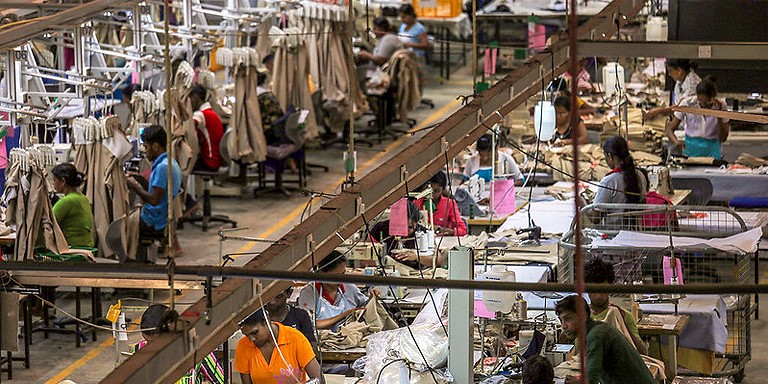
Informality is highly prevalent in the Sri Lankan apparel industry in the Katunayake export processing zone where there has been a labour shortage since the 2010s (Ranasinghe et al. 2016). Against this shortage, informal labour plays a key role in guaranteeing uninterrupted production in the free trade zones (Skanthakumar 2019). Yet, the implications on informal women workers are often overlooked by industry stakeholders, which became particularly evident during the COVID19 pandemic. I give visibility to informal labour and argue that the way women workers experience informal labour in the industry is collectively conditioned by socio-cultural norms, capitalist labour control strategies, and regulatory gaps.
Informal Work: Choice or No Choice?
Informality in the sector is often promoted as a choice; flexible work opportunity with a certain degree of empowerment (Skanthakumar 2019; Wickramasinghe 2020). Yet, informality is mostly experienced by women as a lack of choice, born out of women’s need to juggle productive and reproductive work: namely, work and domestic work. Women’s transition into informal work is shaped by how women workers are controlled at the workplace. Even though formal employment allows seven days sick leave and 14 days annual leave, managers rarely allow workers to avail these. Workers who are hierarchically positioned against the management constantly have to negotiate their right to take leave, almost always with repercussions such as forgoing all their allowances and attendance bonuses (Ruwanpura 2017); requests for leave and absences are met with reprimands and disciplinary actions; lactating mothers and women with toddlers are rarely offered facilities. The sector itself has thus pushed women into informal work with unreasonable demands on their labouring bodies, which women navigate by exiting regular work and entering informal work. In other words, women opt for work environments within which they can discharge their caring responsibilities, while being constrained by gendered norms in the house and at the factory.
The Precarity of Informal Work
Informal work in the apparel sector is not regulated (Skanthakumar 2019; Wickramasinghe 2020). Informality of employment relations, hence, allows manufacturers to circumvent labour laws, by decentralising labour discipline in various ways and effectively externalising labour costs, often borne by workers themselves. Informal workers do not earn statutory payments such as EPF and ETF. They also do not earn monthly production incentives, attendance bonuses, annual bonuses, and overtime payments. Further, salaries of informal workers are not regulated. Different manpower agencies pay diverse rates. Women informal workers are paid lower wages in comparison to men for the same type of work, indicating a gendered wage gap. As of 2022, men were paid between Rs.1,500 – Rs.1,700 while women workers’ daily wages fell between Rs.800 – Rs.1,200. Working hours of informal work are also not regulated, extending to 11–13 hours per day. While regular workers clock in overtime payment after nine hours, informal workers do not have this option. Moreover, working conditions of informal work is not regulated. Thus, often, workers are not able to choose the type of work to engage with. Informal workers are also vulnerable to sudden job losses without compensation as they are not protected by severance laws. While the State might not have directly crafted this ‘illegal’ forms of accumulation, it has nevertheless contributed to its establishment and reproduction by facilitating the resilience of informal work in the local labour markets coupled with the absence of a proper monitoring mechanism.
Informal Work in a Crisis
Structural deficiencies of informal work were painfully laid bare during the COVID19 pandemic, with the worst effects borne by women. When the crisis unfolded, informal workers had little legal and institutional protection. Women who chose informal work for the flexibility of work days, often depended on regular incomes of their husbands. During the pandemic and lockdowns, the husbands – especially the daily wage earners working as carpenters and handymen – were unable to find work. This meant that women became the sole breadwinners of their families, in addition to being the primary caregivers. Unfortunately however, by then, informal work in the apparel sector was scarce or non-existent. Most factories had downsized the operations and had no use for informal workers. Thus, what was earlier a viable strategy for informal women workers backfired during the pandemic.
In order to survive and provide for their families, my research with women workers and labour rights organisations revealed how, many women resorted to short-term tactics, including selling whatever valuable possessions they had, working as housemaids and cleaning services, engaging in sex work, and borrowing from microfinance agents (Gunawardana and Silva 2021). They all had implications which further increased the vulnerabilities of women. For example, the loans came with high daily interest rates of 15-20% that women struggled to pay. One year later, in 2022, women were still paying off the interests of the loans they borrowed a year ago, placing them in a vicious debt cycle. For, once they started to earn, their daily wages were not enough to pay the arrears of the loans as well as spend on food and boarding fees (Dammalage 2021; Gunawardana and Padmasiri 2021). Thus, women kept on either borrowing more money, or let the arrears of the loans accumulate. This in turn had led to domestic abuse. Women reported of getting beaten-up by their husbands, when the husbands learnt about the loans and arrears payments.
Conclusion
I highlight key points that need urgent attention if Sri Lanka’s policy makers are earnest about engendering women’s labour force participation. Informality purports to offer women the possibility to fulfil household duties by combining wage and domestic work. It is the structural bonds between households and the factory floors that unleash a steady supply of cheap female labour that fills informal employment in the apparel sector (Hewamanne 2008; Ruwanpura 2022). This subordination of women through the intersection between spheres of production and reproduction reflects the underlying dynamics of women’s control within households that are channelled through labour markets (Elson and Pearson 1981). Informal labour markets in the apparel sector thus are essentially gendered institutions and gain from women’s disproportionate assumption of household duties; in other words, their employment in the reproductive and care economy (Carswell and De Neve 2012; Mezzadri 2016). In the Sri Lankan apparel sector, the role of the State in this process as a regulator is missing in the informal labour markets. The Sri Lankan government, while scrupulously guarding labour policies on formal work, effectively has turned a ‘blind eye’ to informal labour in local spaces. The State, by its ‘absence’ is thus perpetuating informalisation in local labour markets where women labour under precarious conditions. Therefore, a critical study of the kinds of employment women find themselves pushed into, effectively dismantles the assumption of ‘choice’ implicit in the neoliberal understanding of women’s labour force participation.
Shyamain Wickramasingha is a Postdoctoral Research Fellow at the Copenhagen Business School, Denmark and Visiting Research Fellow at the International Centre for Ethnic Studies, Colombo.
Image source: https://development.asia/insight/securing-womens-place-sri-lankas-apparel-industry
Acknowledgement
This short article is based on my findings from a larger study conducted for the International Centre for Ethnic Studies (ICES) between March-July 2022 on vulnerabilities of informal apparel workers in Sri Lanka during the COVID19 pandemic. I am grateful to ICES for the generous support provided for the study and allowing me space to share the findings with a wider audience.
References
Carswell, Grace & Geert De Neve. (2013). “Labouring for global markets: Conceptualising labour agency in global production networks.” Geoforum, 44: 62-70.
Dammalage, Kaushini. (2021). “Out of the frying pan into the fire: Life of migrant workers in the Covid-19 response”. In Pradeep Peiris (Ed.). Is the Cure Worse than the Disease? Reflections on Covid Governance in Sri Lanka (149-168). Colombo: Centre for Policy Alternatives. Available at https://www.cpalanka.org/wp-content/uploads/2021/08/11-Chapter-7.pdf
Elson, Diane. & Ruth Pearson. (1981). “Nimble fingers make cheap workers: An analysis of women’s employment in third world export manufacturing.” Feminist Review, 7: 87–107.
Gunawardana, Samanthi & Buddhima Padmasiri. (2021). “Avoiding necrocapitalism in Sri Lanka’s free trade zone”. Groundviews (13 June). Available at https://groundviews.org/2021/06/13/avoiding-necrocapitalism-in-sri-lankas-free-trade-zones/
Gunawardana, Samanthi & Nedha de Silva. (2021). “Listening to women in grassroots leadership in a Covid-19 world”. Lens (Monash University) (8 March). Available at https://lens.monash.edu/@celebrating-influential-women/2021/03/08/1382925/listening-to-women-in-grassroots-leadership-in-a-covid-19-world
Hewamanne, Sandya. (2008). “‘City of whores: Nationalism, Development, and Global Garment Workers in Sri Lanka.” Social Text, 26(2): 35-59.
Mezzadri, Alessandra. (2016). “Class, gender and the sweatshop.” Third World Quarterly 37: 1877-1900.
Ranasinghe, Athula, Sunimalee Madurawala, Jen Je Su & Thushara Senadeera. (2016). “An empirical investigation of labor shortage in the manufacturing sector in Sri Lanka”. Griffith Business School Discussion Paper Series 2016-05. Available at https://research-repository.griffith.edu.au/bitstream/handle/10072/390482/2016-05-empirical-investigation-of-labor-shortage-manufacturing-sector-sri-lanka.pdf
Ruwanpura, Kanchana N. (2017). “Limited leave? Clinical provisioning and healthy bodies in Sri Lanka’s apparel sector.” In Rebecca Prentice & Geert De Neve (Eds.). Unmaking the global sweatshop (203-225). Pennsylvania: University of Pennsylvania Press.
Ruwanpura, Kanchana N. (2022). Garments without guilt? Global labour justice and ethical codes in Sri Lankan apparels. Cambridge: Cambridge University Press.
Skanthakumar, Balasingham. (2019). “Living for the day: Contract workers in Sri Lanka’s free trade zones”. Working Paper. Colombo: Dabindu Collective.
Wickramasingha, Shyamain W. A. A. (2020). Labour regimes in global production networks: Comparing the Bangladeshi and Sri Lankan apparel industries. Unpublished PhD dissertation. National University of Singapore.
